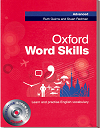

| Book of the Month | ||
 |
Oxford Word Skills |  |
Publisher: Oxford University Press
Authors: Ruth Gairns and Stuart Redman
$29.99
ISBN 978-0-19-462011
A good vocabulary is one of the basics of having good language skills. Therefore how a student learns that vocabulary has an important effect on the entire language-learning process. Here Oxford has produced a book for vocabulary learners by two veteran teachers of English, which the judges of the English-speaking Union's Duke of Edinburgh English Language Book Awards called 'one of the best vocabulary series they had encountered' - a statement which OUP proudly displays on its website. However this statement may be because the judges have not encountered many vocabulary series. At almost $30 this book is not cheap, and the content is of a sort which can easily be found elsewhere. Furthermore, at just 256 pages this book cannot teach more than a small fraction of the tens of thousands of words used in everyday English.
In fact there are 80 exercises in the book - these are indexed at the back - and the text teaches phrases as well as the meaning of individual words. The format is the same as with other books in the series (basic and intermediate). There are thirteen sections, consisting of a topic and review. The topics cover the usual areas of vocabulary books, for example 'Leisure and Lifestyle'. The learning points are not called 'learning points' but are instead annoying headers with names such as 'I can talk about food' and 'I can talk about socializing'. This might work with students at the basic level, but at the advanced level they serve only to teach the meaning of 'patronizing' and 'dumbing-down'. The same 'dumbing-down' process may be why the authors do not teach the word 'transitive' (which is quite important to understanding verbs), but instead put 'sth' after transitive verbs, as in 'to omit (sth)'.
The 'review' section is a mixture of standard cloze, exclusion (pick out the wrong word) and multiple choice. The 'cover and check' process of which the book is rather proud consists of the student covering the answers while doing the questions. In keeping with its general approach, a large blue 'cover card' is provided with the book to save students from having to find their own. Of course, the exercises could have been made fully interactive on the CD which comes with the book (quaintly called a 'CD-ROM' as though the students might be expecting re-writable CDs) but this would make the book redundant. So the CD is used for listening and pronunciation exercises at points marked in the book by a picture of a small headset. These points are at the same place in every topic. However interactive exercises are available at http://elt.oup.com/student/wordskills/adv/?cc=ca&selLanguage=en for those who want to get a feel of what the book is like.
The book itself is the sort of handsome professional text that one expects from this publisher. There is a lot of white space (parts of each page which have neither pictures nor text) and there are plenty of pictures. They are in colour which looks good, but drives up the cost of the book and take up sections of what is is already a limited number of pages, and the pictures are not always relevant or neccessary.
Who is this book for? Students who want to learn vocabulary already have a large number of choices, and may find that if they read fiction at the appropriate level, vocabulary learning comes more naturally and speedily in any case. However, those who need to acquire vocabulary quickly on a specific topic - for instance those studying for an exam - might find this book suitable. Whether one agrees with the Duke of Edinburgh judges or the generally negative opinion of this review is perhaps a matter of taste, but certainly this book is not for everyone.
Verdict: There are better and cheaper alternatives
Assessment 4/10